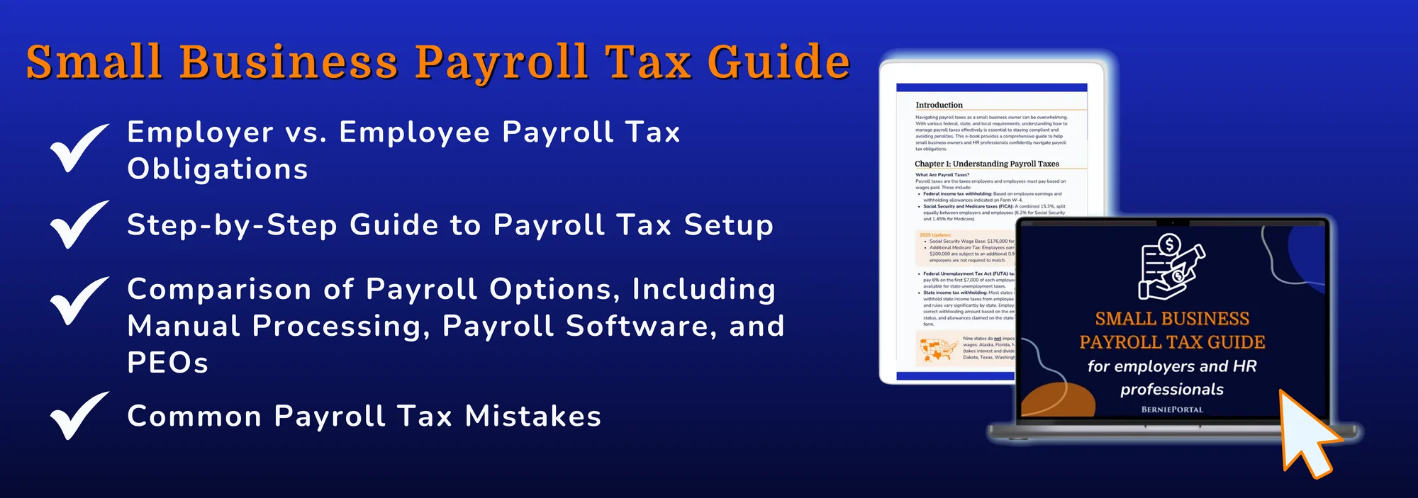
Written by
Germeen Tanas
Germeen is an aPHR-certified writer on the marketing team at BerniePortal. She writes about HR, healthcare, and benefits.
How to Ensure Your Payroll Is FLSA Compliant

In 2004, Walmart’s overnight employees began speaking out about being forced to stay at work even after they had clocked out. The New York Times interviewed Mr.Cobb who said that “on many workers’ fifth work day of the week, they would approach the 40-hour mark and then clock out, usually around 1 a.m.” After they clocked out, they would have to “sit around” until a manager arrived at 6 a.m. to unlock the doors.
Other employees reported finishing their shifts, clocking out, and having to wait on-site until everyone had straightened up the store.
Only a few years later in 2008, Walmart faced 63 more wage and hour lawsuits across 42 states and agreed to pay between $352 million and $640 million to settle. These are only a few of the countless examples of costly FLSA violations.
What Is FLSA?
According to The Department of Labor (DOL), FLSA, or The Fair Labor Standards Act, “establishes minimum wage, overtime pay, recordkeeping, and child labor standards affecting full-time and part-time workers in the private sector and in federal, state, and local governments.” The Wage and Hour Division (WHD) of the DOL strictly enforces the FLSA. As we’ve seen with Walmart and other corporations, noncompliance and inattentiveness to FLSA regulations can be very costly to an organization.
The primary areas of compliance with FLSA that can affect your payroll are minimum wage and overtime pay.
Minimum Wage Regulations Under FLSA
The minimum wage is the lowest wage permitted by law (from a federal or state level) that a worker can be paid. Currently, the federal minimum wage for covered nonexempt employees is $7.25 per hour – this has been unchanged since 2009. However, many states have their own minimum wage rates that exceed the federal minimum wage. To comply with FLSA, all employers must pay employees at least the current federal minimum wage. Employers are required to pay the higher of the two wages (state or federal).
FLSA also lays out regulations regarding minimum wages of tipped workers:
- A “tipped employee” is any employee who receives more than $30 in tips per month.
- The employer may consider tips as part of wages, but the employer must pay at least $2.13 an hour in direct wages.
- An employer is only required to pay $2.13 per hour in direct wages if that wage combined with the tips received at least equals $7.25 per hour (the federal minimum wage).
- If $2.13 plus tip does not meet or exceed the federal minimum wage, the employer must pay more in direct wages.
- Some states require employers to pay tipped employees the full state minimum wage before tips. View the DOL’s Table of Minimum Hourly Wages for Tipped Employees to see the definition of a tipped employee for your state in 2024.
The DOL allows payment of less than the federal minimum wage for some cases:
- Workers under the age of 20 can be paid a wage not less than $4.25 per hour during their first 90 consecutive days of employment, as long as their work does not displace other workers. After 90 days of employment, or if they turn 20 they must receive the federal minimum wage.
- Employers of students in The Full-Time Student Program can obtain a certificate from the DOL permitting students to be paid not less than 85% of the federal minimum wage while they are in school.
- Employers of student learners can also obtain a certificate from the DOL permitting students to be paid not less than 75% of the federal minimum wage. These students must be at least 16 years old and enrolled in vocational education programs.
- Other programs for disabled workers and full-time students may also be permitted to pay employees less than the federal minimum wage, but these employers must obtain special permission from the DOL.
To view the full list of the DOL’s exemptions from both minimum wage and overtime pay provisions, check out their website page.
Overtime Pay Regulations Under FLSA
FLSA protects non-exempt employees and requires employers to pay non-exempt employees overtime for every hour worked over 40 hours. These laws assure fair workplace standards and require employers to post overtime and minimum wage standards in high-traffic, visible areas in the workplace. It is illegal not to pay the overtime rate to a covered, nonexempt US employee who worked overtime in a specific week.
On the other hand, exempt employees do not qualify to receive overtime pay. Certain job duties qualify individuals for exempt status, such as executive, administrative, professional, computer, and outside sales roles.
To remain compliant with FLSA, overtime pay cannot be waived for nonexempt employees, not even for the following reasons:
- An agreement between the employer and employees that only 8 hours a day or only 40 hours a week will be counted as working time
- An announcement by the employer that no overtime work will be permitted
- An announcement by the employer that overtime work will not be paid for unless authorized in advance
Under FLSA, if you require or permit an employee to work overtime, they must be compensated with at least one and a half of their pay rate. This applies to work that exceeds the 40 hour workweek.
FLSA defines a workweek as 7 consecutive days (168 total hours). Covered nonexempt (or hourly) employees must receive overtime pay for hours worked over 40 per the 168 hour workweek. So, if an employee earns $20 an hour, they must receive at least $30 for every hour worked past the 40 (out of 168) hour workweek.
Employers should be familiar with their state’s regulations regarding overtime pay. Some states, like Colorado, Oregon, and California, require daily calculations for overtime pay. If you are an HR professional that is operating in multiple states, it’s critical to be fully aware of the individual state laws to ensure each employee gets properly paid for the number of hours worked.
As a general rule, employees are entitled to overtime according to the standard (state or federal) that will provide the higher rate of pay. Check out our blog on how and when to calculate overtime pay for more information on states with unique overtime pay laws.
Are All Salaried Employees Exempt From Overtime Pay?
Not all salaried employees are exempt from overtime pay. To be exempt from overtime pay, employees must meet requirements in regards to salary and job duties. Exemption status is determined by the overtime threshold.
The overtime threshold is a salary level that helps employers determine which employees are eligible to receive overtime pay when they work more than 40 hours in a single week. Employees who make less than the annual or weekly threshold are considered non-exempt, which means they automatically qualify to receive overtime pay.
Currently, the overtime income threshold stands at $43,888/year or $844/week, which means that people who earn less than $43,888/year or $844/week automatically qualify for overtime. On a federal level, there is no maximum limit to overtime unless an individual is younger than 16 years old.
Meanwhile, because exempt employees are not covered by the FLSA, they aren’t eligible for overtime pay. Employees also must not fall under any of the other exemptions set forth by the DOL.
Employers should stay on top of the latest DOL updates in case the agency decides to adjust the threshold. The next overtime threshold adjustment is set for January 1, 2025.
Other overtime regulations to keep in mind include:
- You cannot take the average hours worked across two or more workweeks to calculate overtime pay.
- Overtime pay must be paid on the regular pay day for the pay period in which the wages were earned.
What’s the Difference Between Exempt and Nonexempt Employees?
When employees are misclassified, it can become increasingly difficult to ensure your payroll is FLSA-compliant. Check out our HR Party of One episode on exempt vs. nonexempt employees to ensure you are correctly classifying employees.
What Happens if HR Doesn’t Comply with FLSA?
Penalties for noncompliance with overtime pay and minimum wage laws may include $1,000 fines for each violation. The DOL states, “Willful violations of the FLSA may result in criminal prosecution and the violator fined up to $10,000. A second conviction may result in imprisonment.” As seen in the Walmart cases, organizations that pay beneath the minimum wage of their locale may also owe back wages, where they must pay employees the amount they owe to meet the minimum requirement. If the violations are not willful, a two-year statute of limitations applies. That statute is extended to three years for willful violations of FLSA.
Additional Resources
You can stay informed, educated, and up to date with important HR topics using BerniePortal’s comprehensive resources:
- BernieU—free online HR courses, approved for SHRM and HRCI recertification credit
- BerniePortal Blog—a one-stop shop for HR industry news
- HR Glossary—featuring the most common HR terms, acronyms, and compliance
- Resource Library—essential guides covering a comprehensive list of HR topics
- HR Party of One—our popular YouTube series and podcast, covering emerging HR trends and enduring HR topics

Written by
Germeen Tanas
Germeen is an aPHR-certified writer on the marketing team at BerniePortal. She writes about HR, healthcare, and benefits.
Related Posts
Each year, new state and local regulations take effect, and with a new administration...
As we approach 2025, it's essential for HR professionals to plan for the upcoming year's...
From major holidays to key compliance and ACA deadlines, here’s everything you need to...









Submit a Comment